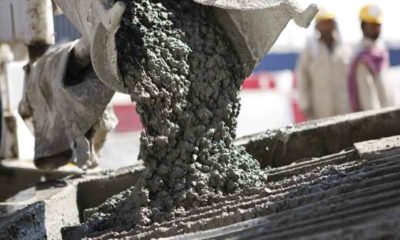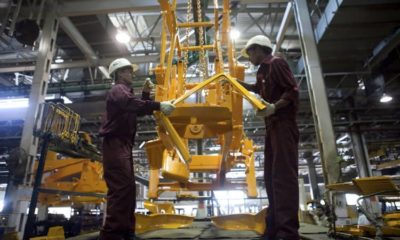- Manufacturing Output Expands by N4.33trn to N16.7trn in 2019
The Nigerian manufacturing output grew by N4.33 trillion in value to N16.78 trillion in 2019, the National Bureau of Statistics (NBS) disclosed this in the Gross Domestic Product (GDP) report released for the year.
The sector’s output grew by 34.78 percent when compared with the output of N12.45 trillion achieved in 2018.
Accordingly, out of the 13 subsectors that make up the manufacturing sector, 12 recorded growth during the year under review while one recorded decline in productivity.
The 12 subsectors were listed as cement which grew by N900 billion from N1.34 trillion in 2018 to N2.24 trillion; food, beverage and tobacco expanded by N1.05 trillion from N5.33 trillion to N6.38 trillion, textile apparel and footwear increased from N2.96 trillion to N3.92 trillion.
Also, listed were the wood subsector which grew by N83.07 billion from N350.35 billion in 2018 to N433.42 billion in 2019; pulp, paper and paper products climbed from N128.58 billion to N206.21 billion; chemical and pharmaceutical products jumped from N279.93 billion to N460.43 billion; and non-metallic products grew by N337.03 billion from N590.21 billion to N927.24 billion.
The report stated that plastic and rubber products subsector recorded an increase of about N258 billion from N389.82 billion in 2018 to N648.17 billion, while electrical and electronics, basic metals motor vehicle and other manufacturing grew from N9 billion, N282.3 billion, N114.02 billion and N456.82 billion to N15.29 billion, N452.67 billion, N198.97 billion and N743.95 billion, respectively.
Only oil refining subsector reported a decline of N61.87 billion to N210.65 billion to N148.78 billion.
Speaking on the sector’s economic output, Adetokunbo Kayode, the President, Chamber of Commerce and Industry, Abuja, said: “Our GDP will continue to go up if we continue to place less emphasis on oil. Why did we go into recession? It was because the price of crude oil was going down. It’s not that we are not productive as a country but we need to take our eyes away from crude oil. We need to emphasise opportunities and open new doors.
“We are not a poor country because we are potentially rich. We are depending on crude oil without focussing on the oil value chain, we import diesel, petrol and petrochemicals.
“This is unbelievable. What is difficult in turning these into opportunities for people. Let’s leave oil where it is, develop the value chain and stimulate our manufacturing sector.”

 Forex3 weeks ago
Forex3 weeks ago
 Naira3 weeks ago
Naira3 weeks ago
 Billionaire Watch2 weeks ago
Billionaire Watch2 weeks ago


 Naira3 weeks ago
Naira3 weeks ago




 Naira2 weeks ago
Naira2 weeks ago




 Naira1 week ago
Naira1 week ago




 Naira4 weeks ago
Naira4 weeks ago
 Banking Sector4 weeks ago
Banking Sector4 weeks ago
























